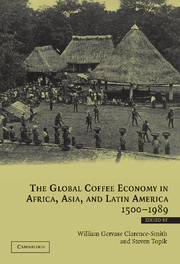Book contents
- Frontmatter
- Contents
- World coffee production
- Guatemala and Mexico
- Nicaragua and Costa Rica
- Brazil
- Cameroon
- Madagascar and Réunion
- East Africa
- Red Sea
- Ceylon and South India
- Java
- Introduction: Coffee and Global Development
- I ORIGINS OF THE WORLD COFFEE ECONOMY
- II PEASANTS: RACE, GENDER, AND PROPERTY
- III COFFEE, POLITICS, AND STATE BUILDING
- 11 Coffee and the Recolonization of Highland Chiapas, Mexico: Indian Communities and Plantation Labor, 1892–1912
- 12 Comparing Coffee Production in Cameroon and Tanganyika, c. 1900 to 1960s: Land, Labor, and Politics
- 13 Smaller Is Better: A Consensus of Peasants and Bureaucrats in Colonial Tanganyika
- 14 On Paths Not Taken: Commercial Capital and Coffee Production in Costa Rica
- 15 Coffee and Development of the Rio de Janeiro Economy, 1888–1920
- Conclusion: New Propositions and a Research Agenda
- Appendix: Historical Statistics of Coffee Production and Trade from 1700 to 1960
- Index
13 - Smaller Is Better: A Consensus of Peasants and Bureaucrats in Colonial Tanganyika
Published online by Cambridge University Press: 01 September 2009
- Frontmatter
- Contents
- World coffee production
- Guatemala and Mexico
- Nicaragua and Costa Rica
- Brazil
- Cameroon
- Madagascar and Réunion
- East Africa
- Red Sea
- Ceylon and South India
- Java
- Introduction: Coffee and Global Development
- I ORIGINS OF THE WORLD COFFEE ECONOMY
- II PEASANTS: RACE, GENDER, AND PROPERTY
- III COFFEE, POLITICS, AND STATE BUILDING
- 11 Coffee and the Recolonization of Highland Chiapas, Mexico: Indian Communities and Plantation Labor, 1892–1912
- 12 Comparing Coffee Production in Cameroon and Tanganyika, c. 1900 to 1960s: Land, Labor, and Politics
- 13 Smaller Is Better: A Consensus of Peasants and Bureaucrats in Colonial Tanganyika
- 14 On Paths Not Taken: Commercial Capital and Coffee Production in Costa Rica
- 15 Coffee and Development of the Rio de Janeiro Economy, 1888–1920
- Conclusion: New Propositions and a Research Agenda
- Appendix: Historical Statistics of Coffee Production and Trade from 1700 to 1960
- Index
Summary
The town of Bukoba has seen better days. Located on the shore of Lake Victoria in the northwestern corner of Tanzania, Bukoba has suffered from years of civil war in neighboring Uganda and Rwanda and from decades of neglect by the distant government in Dar es Salaam. Following German rule from 1889 to 1916 and a British mandate to 1961, this small town was exceptionally prosperous at independence, as were the Haya farmers in the surrounding countryside. Bukoba was the largest coffee-producing region in the country, and investments in trade and education seemed to auger well for the future. Fate has been unkind to Bukoba since 1961. Its coffee economy now supports a tedious status quo of just getting by, rather than a dream of sustained development. Farming is carried out on a small scale by many peasant families, and few have the resources to supply modest inputs that could make a difference to coffee output, such as pumps, fertilizers, and pesticides. This type of small-scale, undercapitalized, market-oriented agriculture is one of the principal legacies of colonialism in rural Africa.
This chapter emphasizes the ability of Haya to make their voices heard and influence the way that coffee was integrated into their society. For all the tensions in the relationship between colonial state and peasants, there was an underlying consensus.
- Type
- Chapter
- Information
- Publisher: Cambridge University PressPrint publication year: 2003
- 3
- Cited by



